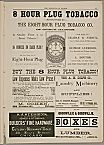| Entries |
| E |
|
Eight-Hour Movement
|

|
In the 1880s, the issue resurfaced and became the key demand of a movement that shook the city and the nation. In 1884, the Federation of Organized Trades and Labor Unions—predecessor of the American Federation of Labor—urged American workers to observe an eight-hour day beginning May 1, 1886. Implying direct rather than legislative action, the eight-hour movement united skilled and unskilled workers of all nationalities. Chicago anarchists, trade unionists, and the Knights of Labor, despite the coolness of their national organizations, actively promoted and profited from the movement, and made Chicago its national center.
In the midst of that scheduled agitation, the bomb exploded at Haymarket, giving the movement its martyrs and diverting and defeating the larger movement of which it had been a part. After Haymarket, the eight-hour day became one among a menu of issues promoted by the labor movement, rather than the key catalytic goal around which a movement organized. Under pressure from newly stable labor institutions, different industries gradually decreased hours, giving workers more time for leisure activities. The eight-hour day finally became a reality in 1938, when the New Deal's Fair Labor Standards Act made it a legal day's work throughout the nation.
The Encyclopedia of Chicago © 2004 The Newberry Library. All Rights Reserved. Portions are copyrighted by other institutions and individuals. Additional information on copyright and permissions.